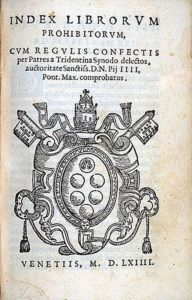1966 The Index of Prohibited Books is ended
The invention of the printing press in the mid-15th century changed society in many ways. Books became far less difficult to produce, far less expensive, and contained content that appealed to a mass market, instead of the largely religious works that had had to be hand-copied. It also meant that dangerous ideas could now spread much more quickly than ever before. Consequently, every government soon developed heightened powers of censorship. England left the control of illicit printing to the Stationers’ Company while in Catholic Europe, the Church was charged with looking out for licentious or heretical literature. To assist local authorities with that task, the Council of Trent authorized the creation of a list of banned books, the Index Librorum Prohibitorum.
After 1571 a Vatican department called the Congregation of the Index considered works thought to imperil the souls or morals of Catholic Europe and updated it as required. Its powers technically lay only inside the territories administered by the Church but the Index was consulted by censors working for national governments. Among those authors listed in the various editions were Protestants such as John Milton, Jean Calvin, and John Locke; scientists such as René Descartes, Francis Bacon, and Johannes Kepler; atheists and Deists like Jean-Jacques Rousseau, Voltaire and Jean-Paul Sartre; and authors such as Dante, Victor Hugo and Alexandre Dumas.
A number of bureaucratic changes took place in the 20th century before the Index was finally abandoned as a continuing form of literary surveillance. Nonetheless, the future pope Benedict XVI reminded Catholics that “the Index retains its moral force despite its dissolution.”
